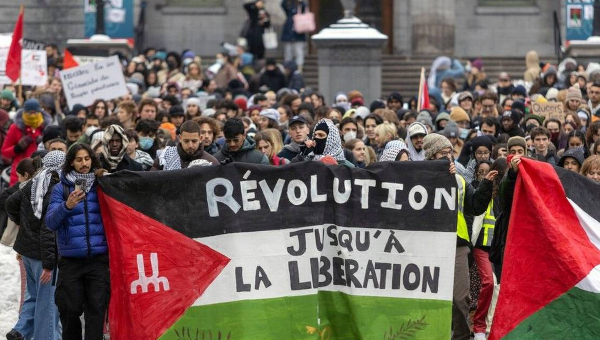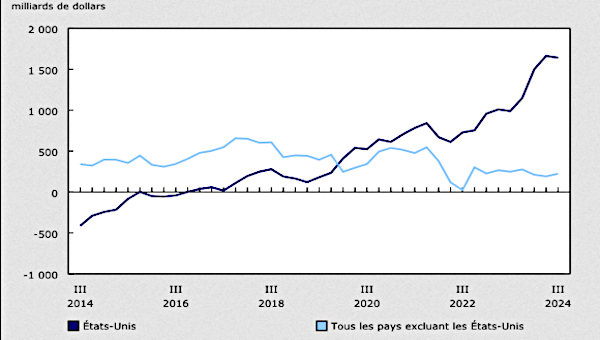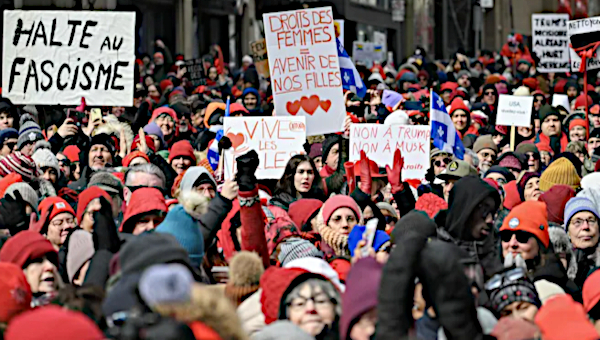Essential Services in Quebec and the ‘crystal ball’ by François Legault
In the present labour dispute in the public and semi-public sectors, the issue of essential services has unquestionably resurfaced in the news. There was also the famous statement by Premier of Quebec François Legault announcing the return to class of Quebec students on Monday, December 18, 2023. Let’s take a look back at these two key issues raised in the last week.
Essential Services and Education
Some people seem to dream of a well-ordered society, free of social conflict. Unfortunately, such a society does not exist.
In societies that recognize conflict as an element of social life, the role of the right – that is to say the justice system – is to regulate the moments when discord between social actors comes to the fore. We live in Quebec in a so-called rights society. Whether we like it or not, the Canadian Charter of Rights and Freedoms and the Charter of Human Rights and Freedoms (Quebec) stipulate in paragraph 2 (d) for the Premier and in paragraph 3 that each person is the holder of “freedom of association.” What is to be said? This provides, according to a number of court decisions, in the case of labour, the right to form a trade union, the right to bargain, and the right to strike, rights which have enjoyed, for a number of years in Canada and Quebec, constitutional protection. With this in mind, it may be interesting to talk about “essential services” in public services, but it should not be forgotten that not everything related to “public services” falls under the guise of “essential services.” This being done, let us continue with regard to the hopes provoked – and the disenchantment that followed – by the statement made last week by the Premier of Quebec, Mr. François Legault. But before that, a little backtracking on the current strike actions.
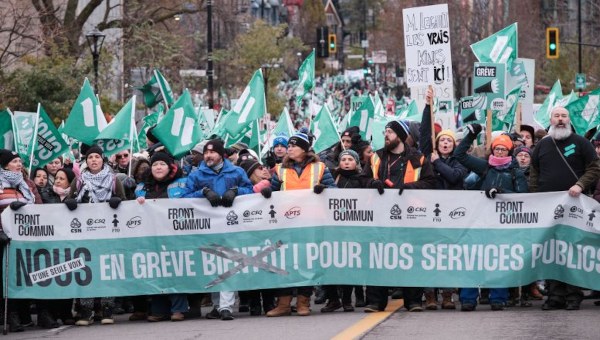
The Strike in the Parastatal Sector (education and health)
There is currently a situation in Quebec in the parastatal sector that is quite disturbing. The 66,000 teachers of the AWF have been on an unlimited general strike since 23 November 2023. Some schools in Quebec have been deserted for more than four weeks. Primary and secondary schools, where we find unionized teachers of the FSE-CSQ, were on strike from 8 to 14 December. The same service interruption applies in the CEGEPs and for all union members who adhere to the Common Front (CSN-CSQ-FTQ-APTS). On the part of the 420,000 members of the Common Front a third service interruption occured. The professional members of the CEGEPs, affiliated to SPGQ, were on strike on 23 and 24 November and 14 December. The health personnel, affiliated with the FIQ (approximately 80,000 members), were on leave of absence on 8, 9, 23, 24 November and from 11 to 14 December. The strikes of the FIQ and the Common Front were carried out with respect for essential services.
Clearly, there are major problems in Quebec in education and health. The Premier of Quebec, François Legault, is calling on the union staff of these two important sectors, so important to our quality of life in society, to exercise more and still more “flexibility.” He announced, during the week of the third stage of the work stoppage of the Common Front and in the midst of the third week of unlimited general strike of the FAE, the reopening of schools by Monday, 18 December 2023. Meanwhile, the end of health negotiations is not predicted to be resolved until January 2024. At the time of writing, elementary and secondary school teaching staff affiliated to the FAE have still not returned to work.
Neoliberalism, Flexibility, and Versatility in the Public and Semi-Public Sectors
The unionized employees of the public and semi-public sectors have been particularly abused since the triumphant and arrogant neoliberalism became, in the late 1970s and early 1980s, the ideological principle of reference for the ruling political class in Quebec, as it did for the Canadian ruling class and that of the other so-called liberal democracies. This ideology is characterized by four main regulatory principles of economic, political and social life:
- The free movement of capital and goods at international level through the proliferation of free trade agreements;
- Priority action on inflation at the expense of unemployment;
- The reduction of State social programmes;
- The weakening of the trade union movement.
It is in this context, in which trade union organisations have found themselves on the defensive, that the working and remuneration conditions of the employees have been negotiated and paid for by the public and semi-public sectors from the beginning of the 1980s to the present. As a result, the remuneration and working conditions in these two sectors have continued to deteriorate and deteriorate.
It should be noted that the public and semi-public sectors comprise a female labour force at around 75%. A labour force that works under pressure and heavy workload. A workforce to which government negotiators and local administrators have repeatedly called for flexibility and flexibility for more than four decades. Faced with these requirements, we can ask ourselves the following questions: What about the recognition of the work women do in the public and semi-public sectors? Is it only women deputies in the National Assembly and women in high-paying jobs in senior civil service or the judiciary who are entitled to equal or fair treatment with their male colleagues?
The Concept of ‘Time’ for François Legault and on the Dramatic Effects of Government Strategy
We do not know how long the present conflict regarding the renewal of collective agreements in the public and semi-public sectors will last. After telling us, in a duet with the President of the Treasury Board, Mrs. Sonia Lebel, that it would be settled on Monday, December 18, or by the end of the holidays, then by the end of the year… the Premier is now talking about January in the case of the FIQ nurses. The Premier is getting wet. He’s playing the video game “Adventure of Link” and, like his character, he deludes us and deceives us. He takes us from date to date, probably relying on the burnout among strikers to see the end of work stoppages. Or perhaps he hopes for a long strike with the AWF that would put the school year at risk. This could be used as a pretext to justify legislative action. Who knows whether or not Sonia Lebel shares the same strategic framework as the Premier…
With his statements and false promises that the end of the school conflict is near, the Premier is playing on the nerves of strikers, the parents, and the children who do not have access to their classes. He is also playing on the nerves of people waiting for surgery or serious medical appointments in the health and social services network. For the time being, the Premier may say that he will not be judged on the means he has used to end the present conflict, but rather on the ends that will sooner or later be reached. However, by allowing the labour dispute in the public and semi-public sectors to continue, the number of voters in favour of his strategies can only diminish. This is because people will inevitably end up saying, “It deprives us of our livelihood.” “It deprives us of access to school or CEGEP.” “It deprives us of access to health services or social services.” “This man and his strategies no longer deserve our support.” Furthermore, by acting as he does, the Premier will also cause resignations of essential health and education employees that will add to the hardships the general population is facing.
The current struggle, led by the leaders of the eight trade union organizations, is not just a corporatist trade union dispute. This is the very definition that will be granted to the working and remuneration conditions of more than 600,000 unionized employees, 75% of whom are women, who have been rotten and whose working conditions and wages have deteriorated over the last 40 years. The issue of salaries is, of course, important but so are working conditions and access to care and services, employment statuses, the number of years leading to job permanence, respect for professional autonomy, etc.
Conclusion
The week, therefore, ends with two observations: firstly, the request to consider education as an essential service is in defiance of the international conventions to which Canada and the provinces subscribe and as is the call to disregard the jurisprudence of the courts of Canada. Secondly, the false hopes aroused by François Legault’s premature and misleading announcement of the students’ return to the classroom as of Monday, December 18 is a disgrace.
Having failed to conclude an agreement with the trade union organizations in negotiation with his government, he remains Premier of Quebec for the last two weeks of 2023, a little more time to find or invent new subterfuges to blame the unions for the present impasse. Those who practice negotiations know that most of the time it is the employer who has control over the negotiating calendar and not the trade unions. The latter remains at all times a subordinate party which may have, depending on the economic situation, a balance of power or opinion which is sometimes favourable or unfavourable.
The holiday season will therefore be the time when we will speak in the cottage of the present labour dispute in health and education.
Happy holidays anyway. •
This article first published on the Presse-toi à gauche website.
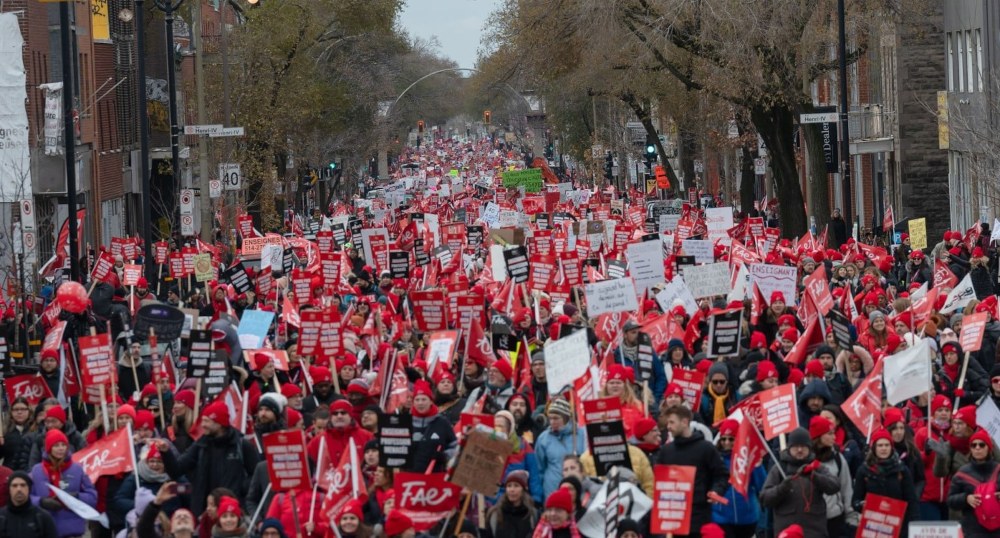
Over Half a Million on Strike in Québec
Over 500,000 Québec public service workers were on strike on Thursday, November 23. There were huge rallies across the province. This is the latest stage of the workers’ struggle to improve both their pay and conditions and the quality of public services.
On November 6, 420,000 public sector workers in Québec’s Common Front of four unions (CSN, FTQ, APTS, CSQ) held a one-day strike as they campaigned for a new contract. On November 8 and 9, the FIQ, with 80,000 nurses and other health professionals, held their first strike in 25 years.
Between November 21 to 23, the Common Front had three more strike days. On November 23 and 24, FIQ is on strike again. The 65,000 teachers in FAE start an all-out strike on November 23. In total over 566,500 people will be on strike on November 23.
After the first round of strikes, public service workers were enthusiastic and energized. These strikes built on a march of over 100,000 people in Montréal on September 26 for quality public services and a good deal for workers. The Common Front members then voted by 95 percent to strike, up to and including a possible indefinite general strike, the strongest strike mandate since 1983!
The Common Front unites workers in demanding improved conditions to attract and retain workers in education, health care, social services and post-secondary education. It also calls for cost-of-living adjustments (COLA).
The public strongly supports the workers in their struggle with the Coalition Avenir Québec (CAQ) government. A poll this summer shows that 87 percent of Quebecers agree that the government needs to improve public-sector working conditions, 86 percent agree that public-sector salaries should at least be indexed to the cost of living, and 75 percent agree that improved conditions will result in improved public services. In contrast, the CAQ’s popularity and satisfaction ratings are falling across Québec, particularly in its stronghold of the greater Québec City region. The public’s strong support, in contrast to his own, can be a problem for CAQ Premier François Legault.
These public service workers, like millions across the country, have had enough after years of austerity and wages that do not keep up with the cost of living. Working throughout COVID to keep society going while the bosses stayed safe in their offices and raked in the money, has fueled the anger. The mindset of workers is no longer to accept bad pay and conditions; they are mobilized and determined.
The Government has the Money
Last week, the CAQ government of Premier Legault announced funding of around $7-million to bring the Los Angeles Kings to Québec City for two exhibition hockey games. The Montréal Canadiens offered to play for no cost!
It also reduced the cost of driver’s licenses for another year, resulting in $600-million in lost government revenue.
The National Assembly in May passed Legault’s government’s bill to give MNAs a minimum of $30,000-a-year pay increase. They are now the highest paid politicians in any province! Premier François Legault’s income increases $208,200 to $270,120 a year. Yet, its pay offer to workers would cut real wages by 6.1 percent by 2027.
These announcements show the contempt the CAQ places on public services and its workers. The Finance Minister’s economic update confirms that the CAQ intends to stand firm on austerity. The Québec state is deliberately depriving itself of the fiscal room to maintain viable public services and provide adequate working conditions.
A Prolonged Struggle Ahead
Faced with the complete refusal of the employers to seriously address low pay, unions have no choice but to increase the pressure and attack the CAQ where it hurts: on the economic front. Gone are the days when unions could think of “convincing the CAQ” of the legitimacy of their demands. This may be a long struggle, but if properly organized, victory can be won.
The struggle of the workers at the 26 government-run cannabis stores (SQDC) who are members of the FTQ provides a glimpse of what it takes to win against this type of government. After an 18-month indefinite strike, the longest strike in the history of state-owned companies in Québec, the agreement reached goes beyond the original demands and grants amnesty for its members targeted by repressive legal measures.
Some CAQ Tactics
Given the strength of the unions and the public support, Legault may well think twice before indulging in a swift, authoritarian decree. The CAQ has several options to try and break the movement. As with the SQDC, it can let the conflict fester in the hope that strikers will give up. A strike is a sacrifice in terms of energy, time and money. The calculation would be to let the cold bite the strikers and the strike funds run dry. If members don’t understand the strategy needed to win, impatience can undermine solidarity on the ground. The CAQ is betting that unions don’t have the capacity to motivate and politicize their members.
The CAQ also hopes that the usual media bludgeoning will eventually take its toll. Columnists will continue to spew their venom, blaming strikers for the consequences of the strike rather than the intransigence of the government that created the crisis. These people are paid to erode solidarity between different sectors of the working class (“they’re taking us hostage!”) and to break people’s trust in the unions.
In any case, strategic thinking to resist the government must start now. It has to happen on the ground, at a grassroots level, during this week’s pickets.
Already there are some cynical comments, such as “We’re negotiating, but it’s not going anywhere.” “We’ll strike, but they’ll decree it.” The unions’ activists need to respond to these remarks and keep the union members motivated. History isn’t written in advance. Every CAQ strategy has its weaknesses. If the workers hold firm and set society ablaze, history will be the story of successful determination.
Build the Strikes’ Momentum
This week’s strikes are important for getting the government to move. In the event of an impasse at the bargaining table, which is likely, the tactical question of calling a third round of strike days or an all-out strike will arise in all union organizations.
Failure to escalate runs the risk of demotivation and cynicism. Conversely, launching an all-out strike without preparation runs the risk of depleting strikers’ morale and strength.
In anticipation of a protracted struggle, union locals should start discussing and planning now for an all-out strike, the timing and duration of which will be decided by rank-and-file members. It starts with organizing picket lines that generate enthusiasm and fill the need for food, toilets, heat sources and babysitting. Planning the political animation of sign-making and banner-making workshops, and speaking at picket lines, are essential for the future.
Faced with a stubborn government, it’s impossible to win by remaining within the legality of picket lines. Strike day actions must have a concrete impact on the government and the capitalist interests it protects. Winning requires the full might of the unions.
Strikes, Blockades and Occupations
Building the workers’ power means disrupting the profits of private companies, like those that support the CAQ. Above all, it means including the whole community in the struggle of public service employees. Everyone who benefits from public services is a potential activist. If, for example, the CAQ prefers to put taxpayers’ money in the pockets of multinational battery companies, block that project until public sector workers win.
Union action and mobilization committees can start thinking about and preparing for economic disruption actions involving as many people as possible. Visits to picket lines by other strikers, the networking of strike committees and coalition work with combative social forces — such as student associations — are important to achieve this.
Helping Each Other to Fight Better
Exchanging ideas on the best tactics and strategies for pressure provides the opportunities to find original ways of getting around the limits to the right to strike imposed by the Essential Services Act.
Why not link with other people’s pressure tactics? Block or occupy companies that pollute, are heavily subsidized or supply arms to Israel? Why not paralyze executive parking lots, block strategic roads or railroads (with due respect for emergency situations)?
If broad sections of society get involved in this strike movement, it could force Legault to make concessions to the striking public sector, and perhaps even precipitate an election. An all-out strike of over half a million workers could become a political strike that could rid Québec workers of the CAQ government.
Public service workers are full of confidence. They will need to pressure their union leaders to stand their ground and to continue escalating actions until the unions win their claims — unlike the leaders of Ontario’s CUPE and BC’s GEU who settled for weak deals. COLA for over 500,000 workers and a rebuilding of public services would be a huge victory and show to all of Canada’s working class what a determined struggle of unionized workers can win.
The momentum behind the Common Front is a historic opportunity for the labour movement in Québec and the rest of Canada! It has the potential to start reversing the decades-long erosion of public services, and to end teacher shortages and endless wait times in emergency wards.
Politicize the Struggle for Victory
With the CAQ bogging down negotiations and choosing to invest in everything but public services, workers have no choice but to take the fight to renew their collective agreements into the political arena.
The CAQ wants to divide union forces and prevent solidarity with the population. To counter this means building the power of workers to fight the power of the capitalists and their governments over living and working environments.
To achieve a victory may require attacking the profits and ownership of private companies behind the policies of austerity, privatization and cutting of public services. The active support of private sector workers is essential.
Through this process, the union struggle can become politicized, transcending strictly economic or sectoral issues and asking the question: “Who runs society and in whose interest?”
If the battle for free, quality public services is to be victorious, workers have to fight to get rid of the CAQ. The 2012 student strike showed, however, that changing one neoliberal government for another wasn’t enough.
The public sector’s fight isn’t just against the CAQ. It’s a struggle for the working class to gain the political power to guarantee the best health care, education and social services, free and accessible to everyone. It’s a struggle to replace a system that must sabotage the services of the majority to maximize the profits of a minority. It’s a socialist struggle. •
This article first published on the Socialist Alternative website.


